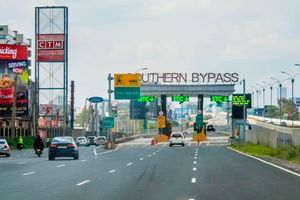Murang'a bar owners yet to heed to Gachagua order

Deputy president Rigathi Gachagua. Bar owners in Murang'a have asked the government to collect but stop interfering with their operations.
Murang'a County security officers are yet to heed Deputy President Rigathi Gachagua's call of enforcing rule of law for area bars.
During his visit to the county on Thursday, Mr Gachagua ordered security agents in Mt Kenya to start cracking down on those behind alcohol menace in the region.
"This habit of bar owners breaking the existing laws so as to enslave our youths in addiction must stop. It must not be all about profits...it is a future generation and all officers wishing to be in my good books must address this issue," he said.
Some bar owners are so bold in their defiance with one in Maragua town asking this writer: "You think Gachagua knows what he is saying? He should ask former Naivasha MP John Mututho and former President Uhuru Kenyatta why they failed to subdue the alcoholic drinks sector".
The trader who runs a nightclub in the Central Business District of the town urged Mr Gachagua to "simply collect your taxes and clear from the scene".
In Murang'a town and its environs, the official police patrol vehicles are yet to drop evening routine of collecting ‘protection’ money from bar owners.
"We have to pay Sh200 per day to police officers so that we can bend the law a little bit so as to operate for longer hours. What is not allowed is to blatantly break the law. As long as we close the doors and make our customers keep peace, we are safe," said a bar owner in Kenol town.
A Friday, Saturday and Sunday night spot check in Murang'a, Maragua, Mabanda, Kenol, Kangari, Ngelelya, Kandara and Kiria-ini towns encountered bars that are not nightclubs operating past midnight and playing loud music in residential areas.
During the day, some bars that are supposed to be open starting 12 noon had opened as early as 5am to enable alcoholics working especially in government and transport service as well as early traders to ‘unlock.’
Also read: Here’s how to survive hard economic times
In some bars, policemen, health workers and teachers were among the early risers or late patrons, defining the vicious ravage addiction is meting out on the pulse of the nation.
Another notable challenge that makes the alcoholic beverages trade slippery is the fact that some bars and dens are owned by politicians, security officers, tycoons and in some cases, criminals.
Murang'a Youth Action Group chairman Waruinge Gitau said: "the combination of diverse investors in this sector makes it a hard nut to crack and most officers see it safer to accept protection fees rather than risk unpredictable confrontations that can even result in sacking".
In the process of that balancing act, bars are left to operate outside the law, making alcohol easily accessible without limitations".
The trend is said to be behind cases where it is normal to see alcoholics trooping into bars and dens the first thing they wake up, some carrying household items to go and exchange for intoxicants.
Mr Gitau said it is a common feature for drunk people to be seen at every given hour of the day and the night "resulting to serious cases of sexual assaults even against males as they stagger home".
But area security defends themselves.
"We have tried our level best as a police department to enforce the law but in most of these bars, you find irregular licenses that have been issued by the county government. We want the county government to help us enforce the law," said Murang'a county police Commander Mr Ali Nuno.
Mr Nuno defended his officers as "doing all provided for in the law but facing limitations by the reckless licencing spree for bars".
Murang'a South Deputy County Commissioner Gitonga Murungi said: "We are waiting for the liqour licensing courts to be constituted afresh so that all stakeholders can be included in it".
" There is no cause for alarm and none around here has the capacity or the guts to defy the Deputy President and the government in the collective resolve to instill sanity in this sector," he added.
But most area people doubt the sincerity of the government officers, blaming them for Murang'a's alcoholism crisis where they break the law through bribery to ensure the county is literally drunk.
Mr Hillary Kung'u from Kirere village being a police officer who was sacked in 2004 for alcoholism says "alcohol crisis in the county is major...it has become so good at preserving the dead and killing the living".
Mr Kung'u said the very same chemicals used in preserving bodies in mortuaries are the same ones being used to make brews "to a point we have the dead and the walking sharing similar body fluids".
In 2015, he temporarily lost his eyesight after he took a brew that ended killing 7 of his village mates.
"It has reached a point where the county should declare alcoholism as a county tragedy. We are losing generations in this alcoholism. Families are breaking up, youths wont found families, our people cannot save and hospital and burial bills have become our daily portion," said Federation for African Women Educationist in Murang'a, Cecilia Gitu.
She said that proliferation of bars, illegal brewing dens and failure to enforce the law in its pure form about alcoholic beverages is to blame.
"It is very sad for county mothers who have to contend with the crisis of alcoholic children of both gender and husbands. The crisis has also struck some young mothers. The crisis is an open wound that is publicly bleeding as our security watch," she said.
Maendeleo ya Wanawake Organisation chair Nyambura Ngugi said "the cry in our families is so major since nearly all of us are affected".
She said there are families that have graves out of alcoholism and "it must be made very clear to the authorities that it is no longer acceptable to be host to reckless alcoholic drinks enterprises that defy rule of law".
Mr Joseph Kibugi who advocates for the empowerment of boy child in the county through Kibugi wa Ihíí Foundation said alcoholism combined with drug abuse contributes to the violent nature of many residents.
"Leaders are to blame...in their entirety. As a result, alcoholism has negatively deprived the boy child the future. The alcoholics cannot sustain marriages...they are struggling to meet conjugal rights obligations, cannot hold on to incomes and eventually it affects productivity and the country wealth," he said.
He said bar owners are running a syndicate of disease, poverty, social disintegration and death in the County.
Murang'a Deputy Governor Stephen Munania told Nation.Africa that it is true there is an alcoholism crisis in the county.
"As a youth aged 29 years, I feel the problem and I identify with it. We have a problem that needs to be dealt with," he said.
Mr Munania said that the problem differ from region to the other.
"Areas that have more unemployed people record more alcoholic challenge. We have a lower rate of alcoholism in the tea zones where most residents are largely engaged in tea picking. The alcoholism problem is more ingrained in the lower zones where poverty levels are high," he said.
The Deputy Governor said there is a concerning trend across the county and especially in every shopping centre "where availability of alcohol has kept the youth and unemployed in perpetual drunkenness by patronizing illicit and cheap liquor dens".
He said that the County government will implement proper licensing mechanism that is anchored in the existing laws.
"We will also execute a robust policy framework that ensures an interagency security partnership to enforce the necessary regulatory policies," he said.
Broader mindset
Further, Mr Munania said "tackling alcoholism among the population will require broader mindset than just insisting on law".
He said that governor Irungu Kang'ata government has committed itself to providing economic emancipation to many through better agribusiness returns, capacity building through Technical and Vocational Education Training and more support to poor families.
"For the serious cases, we will invest resources in rehabilitation efforts through our healthcare facilities," he said.
County Commissioner Mr Karuku Ngumo urged the residents to have the responsibility to report any incident that pose a threat to their security to police or other security agents.
“Report to us those who are behind those illegal activities. There is a safe digital way of reporting to us all those officers and civilians exposing you to any form of threats. When those reports reach us, we always act. Those junior officers might be doing things that are not known to us but when you address them to us, action is always taken to correct the situation," he said.
He said that the menace can be contained if the society made it expressly clear that it does not wish to coexist with those deemed to be progressing activities that are not in the common interest of the society members.
“I appeal to all of you to stop complaining and instead be part of the solution. You are the ones who know the criminals troubling you. Give us the information through the Security Toll free number that is 988,” he stated.
The number receives security reports on Safaricom registered sim cards where the sender starts the message with the name of the County followed by the Sub County, village and then the security tip in brief. The message circulates to the Interior Ministry and it instantly duplicates itself to all senior county security heads who in turn sends it to ground teams.
All the copies happen in a span of less than one minute upon sending hence igniting realtime response.





